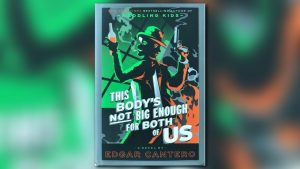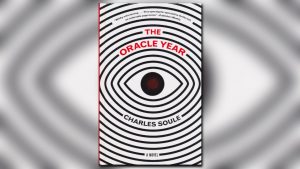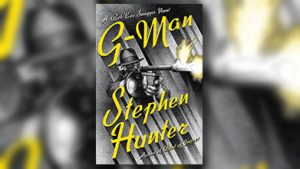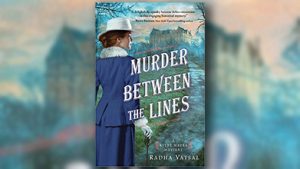“A Teaspoon of Earth and Sea” is set in 1980s Iran.
The main character of the novel is Saba Hafezi.
She is an 11-year-old who has a vast imagination and a deep love for the Western culture.
Her twin sister, Mahtab Hafezi, shares that same love.
Together they hoard American items and feverishly write down every American word they come across.
One day Saba’s sister and mother go missing and she is left alone in Iran with her father.
Saba is certain that her sister and mother moved to America.
Driven by a story her parents told her as a child, that twins are destined to live the same life, she imagines how Mahtab’s life in America reflects against her life in Iran.
While she grows up under a new, tough Islamic regime, she pictures Mahtab basking in freedom.
Throughout this story, Saba learns that only she has the power to control her own fate.
ALBERTO RIOS: Welcome to "Books & Co.." I'm your host, Alberto Rios. We're joined today by Dina Nayeri, talking about her book, "A Teaspoon of Earth and Sea." Published by riverhead books. Welcome.
DINA NAYERI: Thank you for having me.
ALBERTO RIOS: I'm excited to talk about this book. I think it has enormity and complexity, but it's predicated on simple things. And that's what makes it a lot of fun to read. This is a book about Iran. And about a woman, a young woman in Iran, and about women in general in Iran, and maybe just we could say women.
DINA NAYERI: Yes.
ALBERTO RIOS: Now, as writers we're faced with the adage, write what you know. Tell us a little bit about what brought you to writing a book about Iran.
DINA NAYERI: Oh, would you. Well, as you say, I know the women in Iran very well, because I was raise by so different kinds of them, and spent eight years –
ALBERTO RIOS: you were born in Iran.
DINA NAYERI: Yes. And often I stayed in a tiny village about 30 minutes outside, where my father grew up. So –
ALBERTO RIOS: Is that in the north?
DINA NAYERI: No, that's not -- It's -- This village was just a completely different landscape than any of the Iranian cities that I guess people see, and it was just like going back in time. It was essentially run by these women who were just so different, strong, and interesting, fascinating women. And I guess the book is filled with them. So in that sense I wrote what I knew because I used so many of my own experiences from home, and so many of the stories, and the characters, and all of the little tidbits that I carried back with me to the U.S. But in many ways it was something I didn't know, because I had been out of Iran for so many years, for more than 20 years, and so I had to do a lot of research, and in that sense it was a whole new world.
ALBERTO RIOS: Those women, they play quite an important role in the book. And the main character, we watch her growing up, so we follow her life. She is born a twin, that becomes important in the book. But her mother goes missing. And so we see her raised without a mother. But she has these women who, to whom she refers to her mothers. And they have all sorts of things to say to her. There are some difficulties and I want to get to those, but you also have some wonderful parts about just living a civilized life, and how the world works in the small village. Have you some wonderful words like mast-mali, can you tell us about mast-mali and maybe taarof? Yogurt? [laughter]
DINA NAYERI: You've gotten right to some of my favorite things about this book. And about Iranian culture. One of the most interesting things to me about Iranian culture is the relationship with truth and lies and storytelling. Iranians love stories, and it's woven in every part of the culture. And whether you're at a dinner party or with friends, people are always weaving tales and bringing up old stories. It's a very human thing, not so much an Iranian thing. But the relationship collides is particularly run in, because there's several kinds of lies that are sanctioned and accepted by society, people use them in everyday life. And these are two of them. I call them in the book two of the Persian arts, taarof is one people know very well, and it is the art of this polite lying. One of the biggest examples is when someone offers you something, let's say if I offer you a plate of cookies or something, you would have to refuse it three times –
ALBERTO RIOS: refuse it! Not just say "I love these cookies."
DINA NAYERI: No, no. You say thank you, I don't want any, I'm full, whatever it takes. But if you actually want it, you only accept on the third time. And then if you truly don't want it, you refusal three times and the person knows not to go on. But if the person actually doesn't want to offer something, they still have to offer, because they know you'll refuse three times. So then they just don't offer again on the third time. So this people often do when they invite you to dinner. They say, please come this Friday, and you say, no, I couldn't, and they say please do, and you say no, I couldn't possibly. And they stop. That means it wasn't a real invitation.
ALBERTO RIOS: That's great.
DINA NAYERI: And –
ALBERTO RIOS: This happens in the marketplace as well. Not just in homes or something like that.
DINA NAYERI: Yeah. It extends to people, when you offer to pay for a service, or for something you bought, people say oh, no, it's yours. They don't mean that of course, they're just supposed to say it once and that's taarof. It's polite, and it's a lie, but it's something everyone has to do and they have to learn how to do it well.
ALBERTO RIOS: It was hard for me to distinguish a little bit whether in the case of the family here, they have some wealth, and so when SABA goes into the marketplace to buy something, the person says, no, it's yours.
DINA NAYERI: And that person is very poor, and he still does. It's pride. It's part of the culture. You don't just take money. You are often pretending that you don't have needs that you have. And people are supposed to see. People are supposed to be much more clever and astute and see through things, but you're not supposed to confess that you have any, the community is supposed to come and rally around you in that way. It's part of the culture. And mast-mali is another thing that's very interesting. That literally translates to, rubbing with yogurt. So mast is yogurt and it means to rub something with yogurt. That's when you push something under the rug. That's a little pretend innocence. Where something happens, or let's say something uncomfortable topic and instead of addressing it you rub it with yogurt so it can be wiped. And you don't have to actually deal with the truth.
ALBERTO RIOS: OK. Which allows everybody to move forward.
DINA NAYERI: Yes. Yes.
ALBERTO RIOS: OK. You have just to take that a little further, you also have this wonderful moment in which you describe the chirping talk of the Persian mother. It's not a lullaby, it's actual conversation, you characterize it as why, how, what, chirp, chirp, chirp.
DINA NAYERI: To me it sounds like chirping.
ALBERTO RIOS: And I think anybody, especially a child, gets that. You don't always understand the vocabulary, the language, but you hear the sound. And to characterize it, I enjoyed that particular –
DINA NAYERI: Thank you. For some reason those words all I guess for the same reason they all start with WH, in English, they start with the CHUR, so when people talk fast it sounds very much like chirping. I enjoy it.
ALBERTO RIOS: Now, I've mentioned the main character, who is SABA Hafezi, and she is the twin to Mahtab, who she refers to constantly, though I think she becomes absent as we move through the book. We are in a search for her. She imagines that she has gone with her mother to America. So that's a big part of the book. But even with these what I call civilizing sort of structures in place, there's a lot of fear. There's a lot of fear that things get done quote unquote right. And to the extent there's even a moral police, right? Can you talk a little bit about the Mullahs?
DINA NAYERI: Well, in Iran after the revolution –
ALBERTO RIOS: That's a very important milestone. We need to really talk about that.
DINA NAYERI: In 1979, Iran went through a revolution, and then after that khomeini returned and the Shaw was ousted, and then the slam UK republic was put into place. And the world of women became a lot more strict, because now this was an Islamic republic, and Islamic state requires that you wear hijab, often just what they call a rusari, which is a star of around the neck, and covering from head to toe. And -- That are not form fitting. Or sometimes in certain places, places of worship or offices, a big long black chador.
ALBERTO RIOS: You mentioned black, they need to be dark in color.
DINA NAYERI: Yes. Modest in every way, wearing makeup or nail polish, things like that or anything too showy was no longer allowed. And there was a moral police who would go around and enforce this. And, yes, so life became much more difficult for women. The Universities became Islamic, and, you know, then the war happened, and there was rationing of food and a lot of other things that affected day-to-day life. But the moral police I think was one of the biggest things, because they governed your every day life, and would actually take it upon themselves to say, no, you're not covered enough. So you have to push your star of forward a little, or why are you wearing makeup, or why are you wearing this color, or that style.
ALBERTO RIOS: Women do some of the work of enforcing, but it seems to be the men that are -- And their young, and so there's a wonderful line, a very difficult line that one of the quote unquote mothers to SABA says that a beautiful woman always seems to have broken a rule.
DINA NAYERI: Well, it's very much -- I guess it's an opinion. And it's mine, because you know, these are our young men, and a lot of them aren't all that educated and not completely in control of their own urges, and they are -- It's a very, very confusing sudden change. In 1979, suddenly all the rules are different, everything is a sin, and these very young men –
ALBERTO RIOS: for women.
DINA NAYERI: For men too. And so these young men are in charge of enforcing all this, but at the same time they're living a very repressed life, and I guess they have their own self-loathing going on, and there's a lot of human things that conflict with a lot of the rules. And ones that they're charged with enforcing. So in the books there's moments where those things clash in horrible ways. I find it really very interesting, because so many of the people put in charge of enforcing for the republic are so young, and so I guess newly given power.
ALBERTO RIOS: And so young to wield it.
DINA NAYERI: Yes. Exactly.
ALBERTO RIOS: I'd like to just take a moment to remind our viewers that you're watching "Books & Co.," I'm your host, Alberto Rios, and we're joined today by Dina Nayeri, who is talking about her book, "A Teaspoon of Earth and Sea." This idea of the fear factor, what's interesting to me is the different coping mechanisms you have. Some are these little, you know, little slight breakings of the rules. Like somebody painting their fingernails, or wearing high heels, which becomes -- Which becomes important in the plot. But you also have a little bit of something else going on that I would characterize basically as lists of these different listings of things. And one of the things is you have a worries list, which maybe we can talk about, what we're imagining the other twin to be having in the narrative, but you also have -- These are reflective, because in both cases people in America are imagining back on Iran. But it is SABA projecting her SUV as -- Herself as being an American who creates these lists. Like what it is to be an Iranian. She does that with -- In one of the stories. What do you think of somebody reading a list like that?
DINA NAYERI: Any of those things?
ALBERTO RIOS: Yeah, any of them. I particularly like the immigrant worries list. Because I think they're true to any immigrant group.
DINA NAYERI: I actually was a little worried about putting that one in, because it was -- This is supposed to be through SABA, she hasn't been an immigrant yet, so I tried to make them as universal as possible so someone could imagine what it would be like to just be an outsider. But I think the lists really are so much about my own personality, and a part of my personality that seems to have transferred to SABA, which is the list making and the worrying, and the fretting, and the trying to make sense of the world in that way.
ALBERTO RIOS: That's what it is, trying to make sense. Order in some fashion, and understanding its elements.
DINA NAYERI: Exactly. Exactly. And I think the list that you mentioned with Cameron, where it's SABA imagining her sister Mahtab in America, meeting an Iranian-American man, and they are making goals of how to be authentic Persians. And I think that's -- It's been an interesting question for me, but it's one of those things where you try to make something of an entire world, an entire culture and country through these elements that you can maybe put together, the way SABA for example puts together English words to try to make herself feel western. Of course these are just tiny elements of an entire universe that they don't have access to.
ALBERTO RIOS: It's their life now, right?
DINA NAYERI: Yes.
ALBERTO RIOS: And they're half a world away. You use the word "persian." Can you describe, or tell us about that -- The use of the word "PERSiA" and "iran."
DINA NAYERI: I guess it's what we refer to the Iranian people. A lot of people attach some political meaning to one versus another. To me Iran is the name of the country, it doesn't at all reflect just the Iran since 1979. Some people call themselves PERSiAN because of -- Instead of Iranian because they're much more proud of the thousands of years of culture of literature and history that have come out of there and they don't want to necessarily associate themselves with the Iran currently. But Iran is a much older word, it's just the country. For me they're interchangeable.
ALBERTO RIOS: In this -- In the midst of these fears and the moral police, there's still all of this sensuousness. There's a wonderful moment where you have SABA and Reza, where they're in the pantry. I don't know if -- You have this line, she thinks of his feet in the pantry. The two of them barefoot and slightly drunk in the dark. Daring only to feel each other's toes. It's a wonderful, wonderful, very sweet moment, and it is the far end of SENSUOUSness. Can you say more about that? You have all these small little vibrations happening under the hijab. All of this stuff going on. And little ways to have them sort of show themselves. That was a very sweet moment where they're finding their way.
DINA NAYERI: Well, I think two things. First, I want to -- Some universal element of, you know, that kind of coming of age, where everything takes on such monumental meaning and everything is so exciting and new, and just so much of the movement of someone's toes, or the heat of their fingers is just blissful and exciting. But in that sense I guess I was very much using my own experience, as much as what I've learned about Iran through research. But on the other hand, a lot of the people I talked to who lived in theH their teenage years in post-revolutionary Iran talk about how because so much is restricted, every little things takes on significance, and there is those little moments between people that mean so much more than they would to us here because we have them so much more often. And to me that was really lovely, the secret of nature of everything, and then how you can carry something small like that with you for a very, very long time. And we live it over and over because maybe we won't get it again very soon.
ALBERTO RIOS: So it becomes precious.
DINA NAYERI: Yes.
ALBERTO RIOS: Much like and I think one of the recurring themes here is the wonderful just everywhere -- Maybe it's just -- Music in particular, that videotapes, and just different -- Often American, they're all -- They all seem to be American. And references to what they would do in America Via these videotapes and sitcoms and stuff, like Alex KEATON and so on, as if those were the ways to live life here. But she thinks -- I think she knows better, but she nevertheless uses them as good exemplars of how Americans do it.
DINA NAYERI: Yes. That's true. I have to admit that I took a few too many life lessons from Alex KEATON. Why did I do that, I don't know? But -- [LAUGHTER]
ALBERTO RIOS: An obsession with University.
DINA NAYERI: Exactly. He had that in that show. When you are 1st discovering a culture and you're, let's say, me personally, I'm not talking about Saba, but when you come to a country and you are 10 years behind everyone else and you have to learn the whole culture, sometimes you rely on things like television and music and magazines, so that's what I have Saba doing as she wants to learn about America, she's fascinated with this culture and this is the best way to understand it. And in reality, after the revolution, lots of American media still got smuggled into Iran through these video men who would come with their briefcases door-to-door, and trade videos from home-to-home, and often –
ALBERTO RIOS: was this dangerous?
DINA NAYERI: Very, but black market, just like a lot of other black market things, but the interesting thing was that often the videos were mislabeled, or the person would pretend to have some knowledge of the videos they didn't actually have, so they would bring some sort of old Bollywood tape and claim it's a Michael Jackson music video. So I was just trying to tap into that a little, but the music obsession for me was particularly poignant because I started -- I was writing this book to have an obsession with Iranian music. And so I started to just devour it the way Saba devours the American music. So I tried to show a little bit of that. The way I listen to Iranian music, it's so different than the way Iranians listen to Iranian music. For me it's this -- I have it available to me, of course, lots and lots of it, but it still feels like a lost thing that I have -- There's disconnect between me and that world, and there's a particular gap that will never be closed because I didn't grow up there and have that experience. And whatever I can get on spotify is the best I can do.
ALBERTO RIOS: You're showing us the reverse of that in Saba.
DINA NAYERI: The whole thing is the reverse of that. For me, I wrote this book about a girl in Iran, just through research about Iran and through my own obsession with Iran. And she does that with her sister. Makes up stories.
ALBERTO RIOS: "Fast car" is a song that keeps coming up there. Are some favorites, which is interesting, because it's not just generic music or whatever, there are some favorites. And what's wonderful is to see what anybody in any village, anywhere on earth would do is try to start making them your own. So Reza starts playing it on his father's sitar, and there's the wonderful line that he can make anything sound a thousand years old. And that's a wonderful cultural statement, isn't it? Here's this new song, being made to sound –
DINA NAYERI: So old. And it's more of the instruments. When I was in Amsterdam I discovered this quartet of string musicians that would play old Turkish and Iranian instruments and everything sounded so old and beautiful, even things they had just written. I kind of imagined how wonderful it would be to play the you why songs like that.
ALBERTO RIOS: OK. In mixing this old and new culture, and world views, really, you also say something quite interesting, you have one of the characters say, there are -- They're a logical race, these westerners. They don't have spirits and body parts floating around in everyday life. You also mention -- Make other mention, for example, evil eye, or jealous eye and some things like that. That's old world –
DINA NAYERI: Very. There's a lot of superstition in Iranian culture. It's back to the whole relationship of truth and lies. Iranians have such an imagination, such a sense of stories, and old world, and spirits, and mysteries. All of these things. Again, much of them are suffering, but I feel like Americans are a more logical culture, and Iranians take all of these parts with them in their everyday life and they use it to give advice and to make decisions.
ALBERTO RIOS: They make it into something. It doesn't just stay on the periphery.
DINA NAYERI: It's part of the culture.
ALBERTO RIOS: Let me ask you if there have been any repercussions to writing this book. You dispensary village what feels like to an outsider some secrets of how daily life gets lived and how you circumvent some of the more stringent laws and all that sort of stuff. Have there been any kind of reactions of that sort? For you, for the book?
DINA NAYERI: No, not yet. The book only I guess as we're speaking now only came out about a week or so ago, so not yet, but I guess I'm looking forward to seeing.
ALBERTO RIOS: You have also such a wonderful sort of as inspiration that -- Aspiration that Saba has, and she gives it to Mahtab, of going to University. But you have this wonderful characterization of University as a father, BABA Harvard, and it can only be Harvard because of Alex P. KEATON.
DINA NAYERI: He wanted to go to Princeton?
ALBERTO RIOS: Oh, really? But you use Harvard in the book, and it seems no other University will do. It made me laugh. And I think you make good use of that and good focus. But the idea of Bhabha Harvard is you have this wonderful line, only Bhabha Harvard can keep his children from driving a taxi or collecting garbage.
DINA NAYERI: This is very much reflection of the way I thought when I first arrived in America. For me, I arrived in the U.S. with my mother and brother, and my father wasn't there, and I was very close to him. So the fatherlessness of my adolescence was I guess one of the biggest factors, one of the biggest aspects of it. When I went -- I went to Princeton for undergrad and it felt so much like a surrogate father. The first time I went into one of the offices, they gave me a check for my tuition, and a check for my expenses, and then they -- There was all of this entire system built to help your life be -- To run so well. So you can just study. It felt new and interesting, and very father like to me. And I guess that is the purpose of a University. But yeah.
ALBERTO RIOS: I'm glad to hear it worked out. And that it helped to give us this book.
DINA NAYERI: Thanks.
ALBERTO RIOS: And thank you for joining us today.
DINA NAYERI: Thank you for having me.
ALBERTO RIOS: You've been watching "Books & Co." I'm your host, Alberto Rios. We've been joined today by Dina Nayeri, talking about "A Teaspoon of Earth and Sea." Please join us again next time when we will bring you another good book.




















